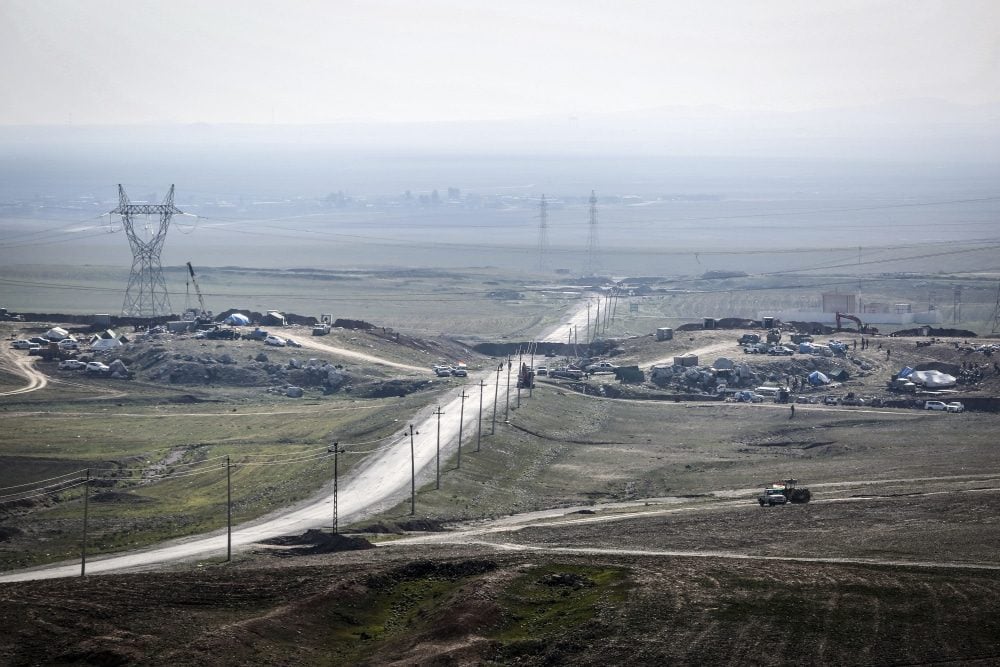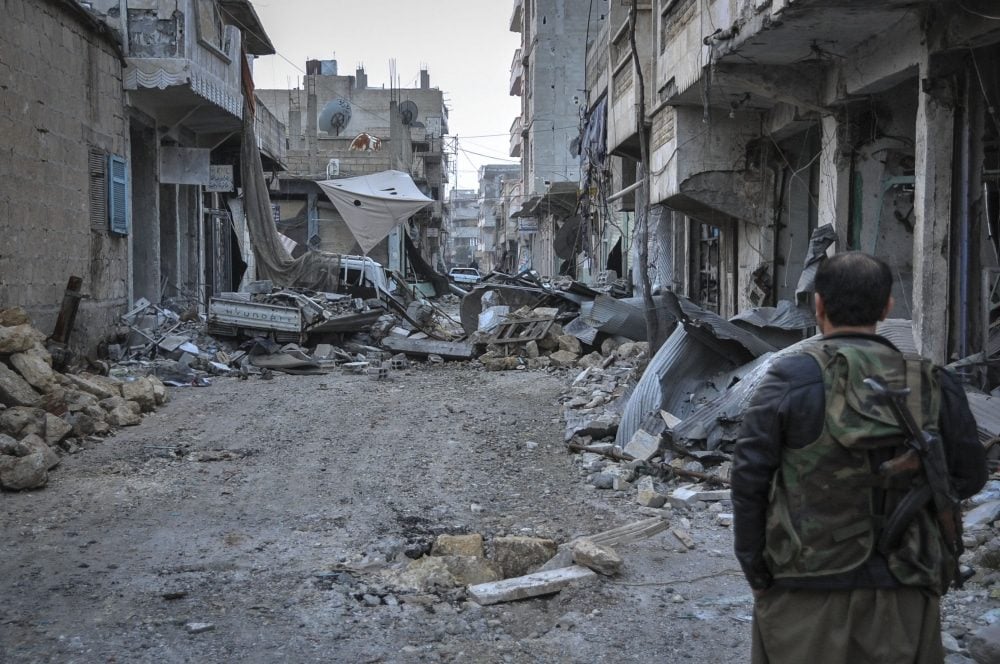IS continues to gain ground in Syria, despite coalition airstrikes, using it as a base to regroup, organize, and expand operations.

KOBANI, SYRIA – JANUARY 28: The wreckage left by fighting is seen in the center of the Syrian town of Kobani after it has been freed from Islamic State of Iraq and the Levant (ISIL) forces. Esber Ayaydin / Anadolu Agency

In early 2015, General John Allen, the US special envoy to the global coalition to counter the Islamic State (IS), said “We are having an impact in Syria; we have struck at IS’s command-and-control nodes, supply lines, fighters and leaders, and military and economic infrastructure and resources in Syria. We have also debilitated IS’s oil producing, processing and transportation infrastructure.”
On 16 January 2015, Pentagon spokesman Colonel Steve Warren said the American military was planning to deploy more than 400 troops to help train Syrian rebels to fight IS. The statement came a few days after a meeting in Istanbul about the training programme between US General Michael Nagata, US Ambassador Daniel Rubinstein, and several Syrian opposition leaders.
Over the last few month, dozens of similar statements have been made about the coalition’s commitment to fighting IS. News of the destruction of an armoured vehicle here and a fighting position there has seldom been out of the headlines.
On the ground, however, there were no signs that IS was about to collapse, that its stability was being disturbed, or that its expansion had actually stopped, especially in Syria.
Several media reports indicated that IS continued to gain ground, even after the start of the global campaign in 2014. In the last few months, the radical group captured several villages in the Syrian west and in the suburbs of Damascus, the Syrian capital, which is controlled by the regime of President Bashar al-Assad. Moreover, according to the US Treasury undersecretary for terrorism and financial intelligence, IS is probably the best-funded terrorist organisation the US Treasury Department has ever confronted.
According to Salah Salam, political columnist and editor of the Lebanese newspaper Aliwaa, there has been a growing acknowledgement of a long-term existence of IS in the region. “Turkey, among other governments, has opened channels for communication with IS, and was consequently able to quickly free its diplomats from Mosul.”
Late in December 2014, the world was shocked when IS managed to shoot down a Jordanian warplane in the Syrian province of al-Raqqa and capture its pilot, Muaz al-Kasasbeh. Media reports have leaked that the Jordanian government has been involved in secret negotiations with IS in order to swap Kasasbeh for several Islamists in Jordanian prisons.
“A bigger diplomatic victory that IS has achieved is that the Vatican has agreed to talk with IS to discuss protection of the Christians living in IS-controlled territories, and find ways to return displaced Christians to their homes in those areas,” said Salam.
In recent months, next to the news about the coalition’s airstrikes on IS, headlines have appeared in the international media conveying a different message: “IS hacks US CENTCOM’s Twitter and Youtube”; “IS issues passports to its ‘citizens’”; “IS about to print its own currency”; “IS to open a bank and start granting loans”; “IS issues a new traffic law”; and “IS opens a medicine school.” Such news gives the impression that, after months of continuous airstrikes, the group’s main structure is still intact, at least in Syria.
Many analysts attribute IS’s relaxation in Syria to the fact that the coalition was focusing on Iraq and a few Kurdish Syrian towns. Jennifer Cafarella, of the Washington-based Institute for the Study of War, said: “IS has lost terrain in Sinjar, which has prompted IS fighters to flow into Syria where they are very seldom targeted. It’s a little bit of a safe haven that IS is able to utilize to regroup and launch a counterattack.”
The fact that IS has been gaining ground was confirmed by a senior US defense official. “Certainly IS has been able to expand in Syria, but that’s not our main objective. I wouldn’t call Syria a safe haven for IS, but it is a place where it’s easier for them to organise, plan and seek shelter than it is in Iraq.”
The statement was also echoed by Col. Patrick Ryder, a spokesman for US Central Command. He said the airstrikes were not intended to prevent IS fighters from gaining ground in Syria but were meant to weaken their hold in neighbouring Iraq.
A report by the Wall Street Journal indicated that some administration officials have been pushing the US to rethink its “Iraq-first” strategy. One of the suggestions is for the US to set up a buffer zone along the Syrian-Turkish border and protect it with air power, while Syrian rebel forces take over the fight against IS on the ground. However, the suggestion faces considerable opposition in the administration, because it entails much deeper involvement in the Syrian crisis.
According to Samir Salha, professor of international relations at the Turkish University of Kocaeli, the coalition needs to review its strategy in the war against IS in Syria. He said the US intelligence has, in fact, failed in its estimates of IS’s military power. “Also, it seems that the state members of the coalition have been lacking harmony and actual coordination in this war.”
At the same time, some observers see that the coalition has been focusing on Iraq, not Syria, because its state members are unwilling to strengthen Assad and shift the balance of power in his favour. In Iraq, the coalition has been coordinating with the government, which it cannot do in Syria. Nothing indicates that plans for fighting IS in Syria would go beyond training the Syrian rebels, shaping them into a reliable ground partner in the war against the feared group. So far, according to analysts, this process has been moving in slowly and could take years to mature. Also, leaked reports say that the Syrian rebel training programme will not involve more than light and medium conventional weapons.
Until this programme yields results, the coalition will probably continue to focus on the Kurdish-majority areas, such as Kobani, around which 75% of the coalition’s strikes in Syria in the last months of 2014 were concentrated.


